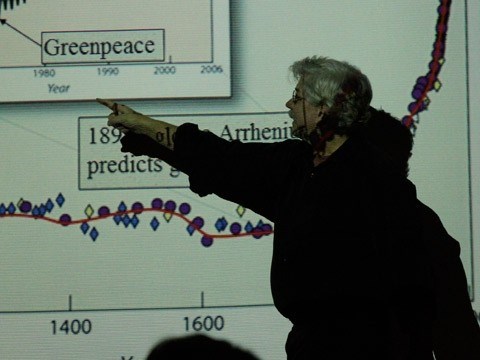Greenpeace International cofounder Rex Weyler spoke passionately this week at a lecture at the Brackendale Art Gallery.
Those in attendance - a mix of old and young - could have expected the former Greenpeace director to wax vitriolic about the state of the world's environment.
And he did, bemoaning the careless waste of consumer cultures, corrupt governments, soaring populations, and the oil and gas industries. What he did not do is offer constructive or creative solutions on how to mitigate the mess.
"The Lower Mainland, including Squamish, has an ecological footprint on the planet the size of all of British Columbia and half of Alberta. That's what we consume in soil, in nutrients, in calories, copper, in phosphorus and all of the things we consume in our lifestyles," said Weyler.
"Add it up, our lifestyle isn't sustainable, it's not remotely sustainable.
"We have to consume less stuff. We never hear the government telling you what the truth is - that we have to consume less stuff. We have to use less stuff, we have to buy less stuff, we have to fix what gets broken and we have to live more modest lives. Nobody wants to tell you that."
In an effort to identify examples of sustainable peoples, Weyler pointed to an ever-shrinking base of aboriginal cultures living in harmony with their landscapes, a reference that has haunted the environmental rhetoric for decades.
While providing a good paradigm of sustainability, many experts on the subject agree that first, second and third world populations have moved so far beyond the forest-people model that it comes off as trite rather than illuminating in the modern debate around environmentalism.
Drawing a parallel between spikes in population growth and consumption, Weyler spoke to the need for nations to improve their human rights towards women in order to provide education.
"Our governments should be refusing to do business with anybody who doesn't make contraception available in their countries," he said, adding that improved women's rights leads to lower birthrates and more manageable populations, which are integral to decreased dependence on natural resources.
"Around the world if we had women's rights and contraception and less children, the birthrate nosedives," he said.
Weyler did not address the complicated diplomatic realities and implications that occur when one culture imposes its norms on another.
The lack of solution-based examples in Weyler's talk could be an extension of his distaste for optimism, a world-view that he believes clouds progress.
"I don't think we have time to be worried about whether or not we are being pessimistic or optimistic," he said.
"I think we have to be realists. We have to look at the world and figure out what's happening and not pretend like we're getting better when we're not."
Absent in Weyler's talk was the acknowledgment of pressure groups and media campaigns both in and out of cities that focus on sustainable living practices. Nor did he speak to the growing movement towards locally- produced food or the metropolitan permaculture movement.
His speech was rife with references to "them" and "us," a polarizing technique used by the former journalist to differentiate between those who are eco-savvy and those who are not.
This, coupled with tired observations of environmental degradation, might have led to the early exit of good chunk of his younger audience close to the end of his talk - these issues have persisted through the decades, but the demographic that cares about them has changed dramatically.
Weyler is right in his observation that today's environmental problems are more sophisticated, but so are the people who care about them.




